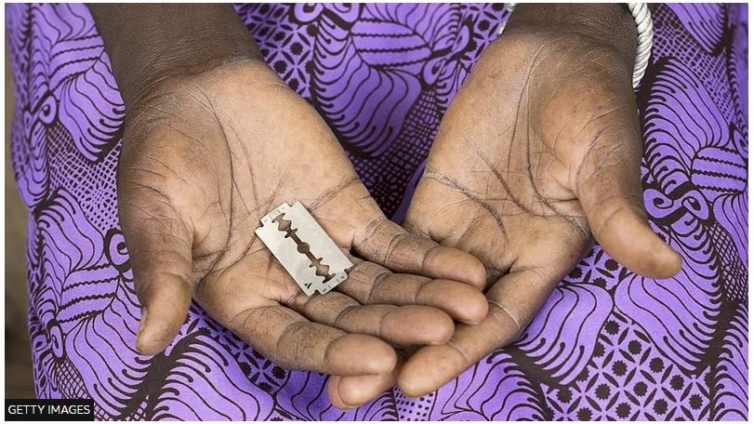
Audio By Carbonatix
A bill aimed at lifting the ban on female genital mutilation (FGM) has been tabled in The Gambia's parliament by an independent lawmaker.
It was outlawed in the mainly Muslim nation in 2015 when Yahya Jammeh was president.
He said it was not required in Islam.
But influential Muslim clerics have been pushing for the ban to be repealed, while women's rights activists have vowed to campaign for it to remain in place.
Mr Jammeh's 22-year authoritarian rule came to an end in 2016.
More than three-quarters of Gambian females aged between 15 and 49 have undergone FGM, according to the UN.
In the procedure's most severe form, after removing the sensitive clitoris, the genitals are cut and stitched closed so that the woman cannot have or enjoy sex.
Followers of an outspoken Muslim cleric, Abdoulie Fatty, rallied in support of the bill shortly before it was introduced in parliament on Monday.
They chanted: "Female circumcision is my religious belief, Gambia is not for sale."
Last year, the cleric helped pay the fines of three women who were convicted of carrying out FGM on young girls.
At the time, The Gambia Supreme Islamic Council, the main body of Muslim clerics in the country, called for the ban to be scrapped.
There are different views in Islam over the practice, with some leading scholars, like those in Egypt, opposing it.
The Gambian lawmaker who is championing the bill, Almammeh Gibba, said it sought to "uphold religious purity and safeguard cultural norms and values", the privately owned Point newspaper reported.
He said the practice could not be described as mutilation if done properly.
The head of The Gambia's Female Lawyers Association, Anna Njie, said that repealing the ban would be a backward step.
"We have no authority to tell the National Assembly what to do, but we have rights reserved in the constitution to take legal action when certain fundamental rights are violated," she was quoted by the local Standard newspaper as saying.
The leader of the majority party in parliament, Billay Tunkara, said it had not yet taken a decision on whether to support the bill.
"We are taking our time because it is a very sensitive area that doesn't only have to do with religion or cultural aspect but also human rights and health issues," he said.
Latest Stories
-
Ho Central Mosque under heavy security, worshippers forced to pray outdoors
10 minutes -
An open letter to H.E. John Dramani Mahama: The audacity of the third shift
45 minutes -
A new era of healthcare dawns in Kintampo: Mary Queen of Love Medical Hospital opens its doors
1 hour -
NDC gov’t has demonstrated strong fiscal discipline – Abdulai Alhassan
2 hours -
Heavily armed Burkinabè soldiers arrested in Ghana
2 hours -
Tamale Chief commends IGP Special Operations Team for crime reduction efforts
2 hours -
None of NPP’s 5 flagbearer aspirants is credible – Abdulai Alhassan
3 hours -
Police arrest suspect for unlawful possession and attempted sale of firearm
4 hours -
3 arrested in connection with Tema robberies
4 hours -
Your mouth on weed is nothing to smile about
4 hours -
25% university fees hike, what was the plan all along? — Kristy Sakyi queries
6 hours -
Some OMCs reduce fuel prices; petrol going for GH¢10.86, diesel GH¢11.96
6 hours -
Trump says health is ‘perfect’ amid ageing concerns
7 hours -
China’s BYD set to overtake Tesla as world’s top EV seller
7 hours -
Joy FM’s iconic 90’s Jam returns tonight: Bigger, better, and packed with nostalgia
7 hours

